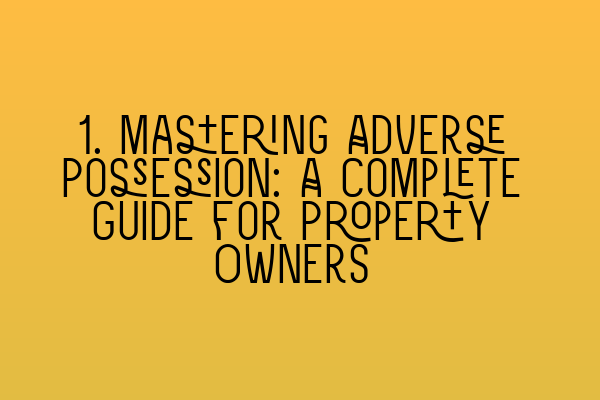Mastering Adverse Possession: A Complete Guide for Property Owners
As a property owner, it is essential to understand the concept of adverse possession. Adverse possession refers to a legal principle that allows a person to claim ownership of a property they have occupied and treated as their own for a certain period of time. This guide aims to provide you with a complete understanding of adverse possession and how you can protect your property rights.
What is Adverse Possession?
Adverse possession is a legal doctrine that allows someone who is not the original owner to claim ownership of a property if they have openly and continuously possessed it for a specific period of time. The specific requirements for adverse possession vary depending on jurisdiction, but typically include elements such as open and notorious possession, exclusive use, continuous occupancy, and the intention to claim ownership.
Adverse possession can occur in various situations, such as when someone mistakenly and openly occupies a piece of land without the true owner’s knowledge, or when a neighbor encroaches on a property boundary over time. It is important to note that adverse possession laws are complex and can vary from one jurisdiction to another. Therefore, seeking legal advice is crucial to understand the specific requirements in your area.
The Requirements for Adverse Possession
To successfully claim adverse possession, certain requirements must be met. These requirements generally include:
- Open and Notorious Possession: The possession of the property must be open and obvious to the true owner and the public. This means that the occupant cannot hide their use and must act as if they are the true owner.
- Exclusive Use: The possession must be exclusive, meaning that the occupant has sole control over the property. If multiple parties are sharing possession, adverse possession may not apply.
- Continuous Occupancy: The occupant must continuously possess and occupy the property for a set period of time. The length of time required varies by jurisdiction, typically ranging from a few years to several decades.
- Hostile and Adverse Intent: The occupant must possess the property without the owner’s permission and with the intent to claim ownership. This requirement does not imply malicious intent but rather a possessive mindset.
- Payment of Taxes: Some jurisdictions require the occupant to pay property taxes during the period of adverse possession. This helps demonstrate the occupant’s intent to treat the property as their own.
It is crucial to note that each jurisdiction may have additional or slightly different requirements. Therefore, it is essential to consult with a qualified property law solicitor to understand the specific requirements in your area.
Protecting Your Property Rights
To protect your property rights and prevent adverse possession claims, there are several steps you can take:
- Regular Inspection: Regularly inspect your property to ensure no one is occupying or encroaching upon it without your knowledge. Promptly address any issues or disputes with your neighbors or occupants.
- Boundary Marking: Clearly mark your property boundaries with fences, walls, or other visible markers. This helps establish the limits of your property and provides evidence of your ownership.
- Property Maintenance: Continuously maintain and improve your property to demonstrate your active ownership and possession. This can include landscaping, repairs, and overall care for the property.
- Lease and Rental Agreements: If you allow someone to occupy your property, ensure that you have written lease or rental agreements in place. This helps clarify the temporary nature of the occupancy and protects your ownership rights.
- Legal Advice: Seek legal advice from a property law solicitor to understand your rights and obligations as a property owner. They can guide you on the specific laws regarding adverse possession in your jurisdiction.
Conclusion
Understanding adverse possession is crucial for property owners to protect their rights and prevent any potential claims. By being proactive, regularly inspecting your property, and seeking legal advice when needed, you can minimize the risk of adverse possession. Remember, each jurisdiction may have specific requirements and timelines, so consulting with a qualified property law solicitor is essential.
For more information on property law and the SQE exam, check out these related articles:
